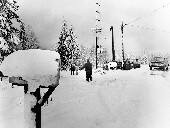
TUESDAY, Dec. 29 (HealthDay News) — Winter’s icy sidewalks and frigid temperatures can be challenging for anyone, but they pose extra hazards for elderly people, experts say.
Falls are the leading cause of injury-related deaths for adults over age 65 in the United States. Some 1.8 million people aged 65 and older were treated in emergency departments for falls in 2005, and 15,800 died from their injuries, according to the U.S. Centers for Disease Control and Prevention.
“Something as simple as a fall can be devastating for older men and women,” said Dr. Evelyn Granieri, director of the division of geriatrics at New York-Presbyterian Hospital/The Allen Hospital. She pointed out that it is important to prepare for the season and take steps to reduce the risks of falling.
Age-related changes in vision, reflexes and response times make toppling over more likely. Medications — including cough and cold remedies, sleep aids and anti-anxiety drugs — can also impact equilibrium. Seniors are both more likely to be taking multiple drugs and to be affected by side effects, experts say.
To prevent falls, it’s best to avoid icy, slippery walkways. If it is necessary to go out, wear comfortable shoes with anti-slip soles. Those who use a cane should make sure the rubber tip is in good condition. If it’s worn smooth, it can be slippery on wet surfaces, Granieri said.
Many falls, however, occur inside the home. To protect against tripping hazards, remove clutter, low coffee tables, electrical cords and throw rugs. Older people often have difficulty adjusting to changes in light, so make sure all rooms are well lit. At night, use night lights in the hallway and bathroom.
Seniors are also less able to a regulate their body temperature, putting them at increased risk of hypothermia. Each year, about 600 Americans die from hypothermia, according to the CDC. About half are 65 or older. Keeping the thermostat set to 65 degrees Fahrenheit, even when no one is at home, can prevent this.
Never use a gas stove or oven to heat the home. Make sure there are working smoke alarms in each area of the home. And for those who live in a house rather than an apartment, carbon monoxide alarms should also be installed.
Winter is also the peak of flu season, a serious illness that kills some 36,000 people in the United States each year. Though this year’s H1N1 flu strain is hitting younger people unusually hard, typically, the flu is most dangerous to older adults who may have other chronic medical conditions.
It’s still not too late to get vaccinated. The flu season begins in mid-October and runs through March.
Avoid strenuous activities, if possible. But if it is necessary to shovel snow, limber up by stretching and take frequent breaks. Also be sure to drink plenty of water to avoid dehydration. Though people may feel less thirsty in winter than in summer, those over 60 can get dehydrated more quickly than younger adults.
People who live alone may want to have a personal emergency response system, a device worn around the neck or on a bracelet, that can summon help with the push of a button.
More information
The New York City Office of Emergency Management has more winter safety tips.

